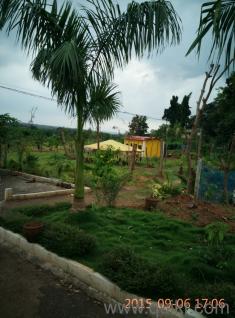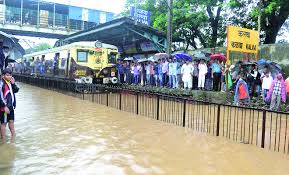Hurricane Harvey lay down unrest in Houston
and Texas
leaving the beautiful cities in ruins; it destroyed buildings, boats and homes.
The rescue team put in all their efforts and saved their animals and people. It
was just about the time when the world had begun to forget Typhoon Hato which had
triggered one of the worst floods in Hong Kong .
Close behind was storm Pakhar that hit Hong Kong and Macau .
The people in these areas are fewer compared to the populated Bangladesh in South Asia ,
where the recent floods killed more than a thousand people. The monsoon was consistent in India this year till the torrential rains hit
the over inhabited city of Mumbai , the
industrial capital of India .
It began with steady rains for a couple of days and finally culminated into
floods bringing the city to a standstill.
The city of Mumbai is densely occupied with people representing every
family in India .
The pictures of the floods hurled me two decades back. The situation was no
different then; however, the media was not as active as they are now. Mobiles
and social media had not crossed the Indian threshold. The BSNL had not
installed its network of lines in several housing complexes in the suburbs of
Mumbai where we resided. It was a lengthy affair to talk to friends and
families living in other cities. One had to line up like the long queue at the
doctor’s after registering the details. The suburbs was a little lesser polluted and
populated. The flats were a little bigger than the usual ones, and a few
picturesque spots of nature were certainly visible in the developing concrete
jungles.
It takes me back
to my first set of teacher friends in Mumbai. They were Nancy, Padma, Agnes,
Priscilla, Asha and Sanjay, who travelled along with me to the school where we
worked. There were many more teachers
who worked in different schools and got off at different stations, but we would
board the local train at the same spot to disembark at Vasai station.
Priscilla, Agnes, Asha and Sanjay belonged to the villages that lined the suburban
stations. Agriculture and fishing were two main occupations in these villages.
White onions, cluster beans, tomatoes, potatoes, and other seasonal crops were
cultivated and marketed here. The closest village was around twenty kilometres
away from the station. My friends would travel by buses to reach the station by
6.30am. It also meant that they began their day at 4 in the morning. Padma and
I lived in the 6000 flat project of Lodha builders, which was around 15 minutes
away from the station. We would have to walk most of the days as the auto
rickshaws had not begun plying from anywhere near the building.
There was a long
straight road through a stretch of fields connecting the station to Lodha homes
under construction. Many a times we would soar, jump and move over the puddles
and cemented surfaces to reach the station via this road a few minutes sooner.
It was utmost difficult to cross the stretch during the rainy season. It would
pour suddenly and within minutes we would get drenched, in order to prevent
this, we would wear our raincoats, the all seasons’ belle shoes sold specially
by 'Bata ' to manage the situation. We
would have to stand near the doorway of the bogie to jump out as soon as the
train reached Vasai; this also meant we could get wet by the sudden bouts of rains
in the moving train and by the displaced stagnant water lying on the roof of
the train. Sometimes, we would have to walk from Vasai station to St’ Francis
school where we worked, and then it seemed as if the rains that we had escaped
while boarding the train had followed us fiercely to leave one soaked to the skin within minutes.
The monsoons were dreaded by one and all as it showed no mercy, no distinction
and treated the rich and poor at the same pace, with the same parity. These
situations often made me miserable and detest the place owing to the hopelessness
of reaching out for a help. The apathy of nature remained the same for the rich
and the poor.
One of the days
it poured heavily and did not stop raining. The school authorities were kind
and closed the school a little earlier than usual to help us reach back home
safely. The teachers who lived nearby
looked into the dispersal of the students. My friends quickly boarded an auto
rickshaw to reach the station. A few of us had to sit with the driver in front.
The unlucky ones who sat near the driver had to keep the umbrella open to make
their shade and turn fully and look outwards to maximise their balance. The
city of Mumbai literally applies the concept of
‘Survival of the Fittest’ from Darwin ’s
theory. On reaching the station, we saw a sea of people waiting for the next
local train to arrive. We pushed ourselves through the crowd till we reached
the platform where the ladies compartment of the train usually halted. There were
hushed voices, loud laughter and grim ladies who wrestled through the crowd
making their way towards the end.
The station was
crammed with people as four of the trains had been cancelled. The authorities
said that the services would resume a little later as the tracks were submerged
in water. There was no bus service to reach home. My friends who had endured
these situations, told me that it would be the best to walk on the tracks and
that we would reach home within an hour. The tracks are the dirtiest places to
walk on in Mumbai, and there was a creek flowing under the tracks midway that I
feared when I travelled by train everyday. Today, it meant crossing the
overflowing tracks above the creek in the pouring rain. It also meant that a
single wrong step could be my end. God knows where my body would have been found, as
the creek joined the rivulets that lead to the sea, but before that the muddy brown
water would have drowned us.
Those who lived
away could do nothing but wait till the situation improved. There was no place
to sit. Agnes suddenly commanded, ‘let’s begin walking as it is just a
station’s distance’. My friends folded their saris and salwars (trousers) to
knee length with expertise and ask me to follow them.
As we walked, we found the water growing
deeper, the mud softer, but we counted our footsteps on the wooden ramps. After
half an hour’s walk we came across the creek. The railway track now stood high
above the creek. The wooden ramps were clearly visible. We stepped on the
wooden ramps and walked slowly. People behind us roared to make way; everyone
was in a haste to reach home. We prayed fervently and gave a sigh of relief on
crossing. There were a few sick people, some whose feet ached, a few others who
were thirsty, but everyone was helpful. They gave water to the thirsty, helped
the needy, greatest bonds of humanity were visible during the adversity. By the
time we reached home, we saw the weather improving and water receding
miraculously. Mumbai has always been spectacular in evoking fears during its
worst times and ending the situation with a surge of gratitude and inner
strength.





People of Mumbai are known for this.Very helpful at the times of need and
ReplyDeletenon interfering during other times.
Your write up is so good that I could visualise the scene vividly.
True Vimala, but the situation remains the same, the state authorities need to put an end to the miseries of the people.
Delete